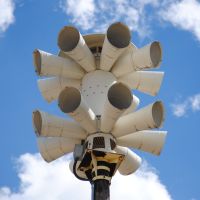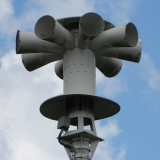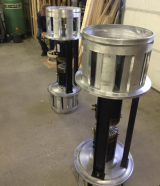16V1T-B
| Model 16V1T-B | |
 A newer Sentry 16V1T-B, located in Lampasas, TX. Photo taken by BlockTSE. | |
| Company | Sentry Siren, Inc. |
|---|---|
| Produced | 2004-present |
| Type | Omnidirectional Electromechanical |
| Sound output | 129 dB @ 100 ft |
| Horsepower | 16 hp (2x8 hp) |
| Voltage | 72 V DC |
| Preceded by | |
| Documentation | Product sheet |
The 16V1T-B is a DC-powered omnidirectional siren produced by Sentry Siren. A product introduced after much experimentation, the 16V1T-B was once Sentry's most popular DC offering but has been superseded by the 14V-B since its introduction.
History and Design

The 16V1T-B was introduced in the year 2004, as Sentry's largest battery backup equipped siren. The 16V1T-B was the end result of an experiment by Sentry to create a DC-powered siren, in order to compete with the likes of the Federal Signal Model 2001 and ASC Tempest sirens which were outselling Sentry's AC-only offerings. This began as the dual tone, dual rotor 15V2T-B in 2002, which was later refined into the 16V1T-B. Due to being a derivative of the 15V2T, the two sirens are very similar. Like most of Sentry's sirens, the 16V1T-B uses the Sterling Model M's rotor and stator.
The 16V1T-B shares the same design as the 15V2T and 20V1T, being a large dual rotor siren with 8 long horns attached to each stator port. The 16V1T-B comes stock with these horns, however the siren can be ordered with skirts instead of horns if the customer requests such; 16V1T-B-SC is the name given to skirted units. On older units, these horns are flat at the end, but later production 16V1T-B units use pointed horns to help keep debris out. Unlike Sentry's other dual rotor sirens, the 16V1T-B is exclusively DC powered, using a pair of 8 hp 72 V DC motors, one for each rotor. Because of this, the 16V1T-B is always the same height as a single-phase Sentry dual rotor siren. Due to running on DC power, the siren can run on battery backup, allowing it to run for approximately 30 minutes after AC power is lost.

The 16V1T-B comes in 8/8-port single tone by default, though it can be special ordered as the 8/16-port 16V2T-B if desired. On 16V2T-B units, the 8-port rotor is always located on the bottom, while the 16-port rotor is always on top, as is standard for Sentry's dual tone sirens. The 16-port side has two ports per horn. The horns and both intakes are protected by mesh screens to help keep debris out of the rotors. The siren is able to reach 129 dB at 100 ft as claimed by Sentry. Due to the asynchronous nature of DC motors, the two motors do not run at the same speed, which causes a distinctive warbling sound as the sound output of the two rotors boost each other.
Due to being a vertical omnidirectional siren, its design is quite simple and similar to Sentry's other sirens. The siren itself is held up by a 6-legged mount which is directly attached to the bottom stator, which has a cone on the bottom to project the sound from the intakes better. The motors are in the middle of the siren, between the two rotors. They are protected by a cylindrical motor cover with ventilation holes to protect the motor from the elements. The upper intake on the siren is protected by a large rain shield, that keeps debris and moisture out of the top rotor. An eyebolt is also included to make installation easier. The 16V1T-B comes with 16 horns, all of which are equal in length.
The 16V1T-B sells well to this day, being one of Sentry's most popular options despite its flaws. It is Sentry's second loudest siren (at least by Sentry's claims on their website), only beaten by the 40V2T. It has been superseded in sales by the 14V-B but continues to hold a place in the market.